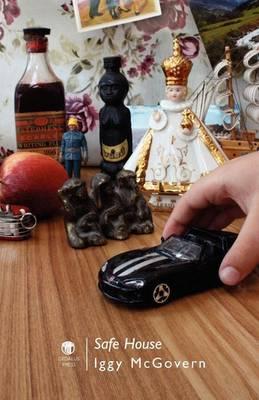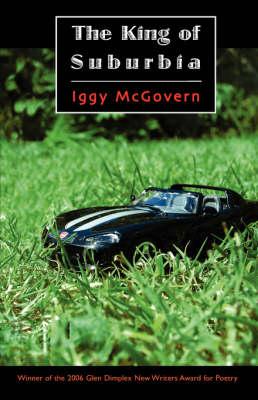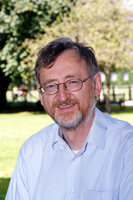Iggy McGovern
 Iggy McGovern was scheduled to present at the The Press Christchurch Writers Festival 2010. When the Festival was cancelled, the Irish poet and physicist continued his visit to Christchurch and launched his new collection Safe house at Al’s Bar on Wednesday 15 September 2010.
Iggy McGovern was scheduled to present at the The Press Christchurch Writers Festival 2010. When the Festival was cancelled, the Irish poet and physicist continued his visit to Christchurch and launched his new collection Safe house at Al’s Bar on Wednesday 15 September 2010.
Berinda Joy of Christchurch City Libraries contacted him for an interview and Iggy kindly obliged.
- We were all disappointed when the Press Christchurch Writers Festival was cancelled. What had you planned to share at your session, "Poetry for Lunch?"
- As I recall, we each had nine minutes so I was aiming for four or five short poems from my new collection. Someone once said that life is about the 4 Ps: Physics, Poetry, Politics and Prayer. I planned to read a poem for each P, and end with a poem called South Island which is about home thoughts from abroad (in this case Christchurch).
- In my recent interview with Owen Marshall, he mentioned how important it is to talk to other writers and that he’d been looking forward to speaking with you and the other panellists for “Poetry for Lunch.” You were also going to participate in “A Tale of Two Cities: Belfast and Glasgow” and “Survivor Poetry.” What had you been looking forward to most at the Writer’s Festival?
- The 2006 festival was a most enjoyable experience so I was really looking forward to this return visit. Amen to meeting other writers, and Owen in particular as I had read his work, but also the names that were unfamiliar to me. Judging Survivor Poetry fairly exercises “ze leetle grey cells”: and reminds me to “judge not, lest…!”: I was more anxious about the third component, interviewing Liam McIlvanney about his novel. It’s a great read and I kept thinking it would be better just to have Liam read from it, except that he is such an interesting person that I wouldn’t have to do more than set him going.
- After the festival was cancelled you decided to continue with your visit to Christchurch to launch your new poetry collection, Safe house. Have you spent much time in Christchurch? What are your reflections on the Garden City? Do you have memories of Christchurch, the landscape - new or old? Has Christchurch influenced your writing?
- This is my third and longest visit to Christchurch. I has here briefly for the 2006 festival and again briefly in 2009 following the Auckland Writers and Readers Festival. I was in Sydney when the earthquake happened, due to fly to North Island for a couple of events. I also had a post-festival event in Dunedin so I kept to my itinerary.
In any case, there were people in Christchurch that I wanted to see again. These included local poets and two families with a Trinity College Physics connection; Niall and Jan Holland’s son Brendan is the most recent PhD graduate from my research group and Mick and Fiona Rynne go back a long way to when Mick was my first graduate student. I do like Christchurch, it’s just the right size — I had the ultimate pleasure of being recognised when I came into the library! South Island is the only Christchurch poem so far but the 2010 aftershocks are bound to ripple up sometime soon… - I imagine writing a collection of poetry could have its own challenges. As with any collection, be it an art exhibition or a music CD, there needs to be a cohesion between pieces—separate works that together create a whole. Is there a thread to your work? Do you have an idea of this “cohesive thread”: before setting pen to paper? Or does your work flow organically?
 I’m hardly an expert but I suspect that any cohesion comes after the event, when looking at how individual poems stand in relation to each other. First collections generally are not cohesive (the best poems in the best order…) but second collections might see the beginnings of this.
I’m hardly an expert but I suspect that any cohesion comes after the event, when looking at how individual poems stand in relation to each other. First collections generally are not cohesive (the best poems in the best order…) but second collections might see the beginnings of this.
However, Safe house is more about what’s not in the collection, namely poems about The Troubles in Northern Ireland. The book is in three parts with Part I focusing on my pre-Troubles youth in that strange politico-religious environment, while Part III is more post-Troubles, and leans towards science. One might expect from the time-line that Part II would engage with the actual Troubles but it doesn’t, preferring an even older period just prior to the outbreak of World War II. One interviewer has tackled me about this already, to which the reply was/is “I’m not ready yet.”- There is a history of scientist/poets—Goethe, being the most famous. You stated in an Independent.ie article that science and poetry don’t marry, but complement each other. You went on to say: “Science is always striving for the one meaning and is ruthless about excluding things that are unsubstantiated … Poetry on the other hand is always striving for different meanings.” In a lecture you give across continents: Science and poetry: not so different? Do you detail any points that link science and poetry? Can you discuss one point here?
- You can’t gainsay the fact that physicists and poets use words in completely different ways. Nevertheless, it is possible to draw other more general parallels between them. My lecture appropriates the ideas of Miroslav Holub to illustrate these parallels, most notably his suggestion that ultimately they are both about the defense of Truth. I wish everyone would read Holub’s essay Science and Poetry (and the other essays) in his wonderful collection The Dimension of the present moment.
 Full-time writers often have to wear many hats. For example, you are a physicist, Associate Professor of Physics at Trinity College in Dublin, and a poet. Does wearing this many hats detract from or enhance your writing life? How did you make the leap from science to poetry?
Full-time writers often have to wear many hats. For example, you are a physicist, Associate Professor of Physics at Trinity College in Dublin, and a poet. Does wearing this many hats detract from or enhance your writing life? How did you make the leap from science to poetry?- Oh, I haven’t made the leap yet. That is, I don’t want to have to choose between them. I think they support each other and sit quite well together. One advantage of poetry over prose, say, is that there is no requirement to sit at the keyboard all day; poetry can fit easily into the cracks of the physics day. And physics can certainly offer ideas for poetry. The only problem there is that science itself is not widely appreciated — though that seems to be changing.
- Do you have a particular poem you have written that especially sticks with you, revisits your thoughts from time to time?
- I am particularly fond of a poem in my first collection The King of Suburbia called Knight Errant. This is a memory of my father, who remains something of a mystery man (I suspect that we are too much alike). The poem celebrates a closeness triggered by, of all things, a bicycle-clip! I also like the poem for its little muse-moment. I was stuck for a particular rhyme, a trade name of bicycle that would rhyme with “fear”: and happened accidentally upon the word “Destrier”: which is a war-horse. This both completed the poem and provided its title.
- Your second collection of poetry, Safe house has been published. What projects are you working on at the moment? Anything on the backburner?
- I’m not writing much at the moment; I had a similar fallow period in the wake of my first collection. I’m thinking of attempting a verse novel and Part II of Safe house was a short-form try; I’m encouraged by the response that it has created.
- Which books went into the building of you? What books would you not be 'Iggy McGovern' without?
- Undoubtedly, it would be Miroslav Holub’s collection of poems Before & After. Holub being both scientist and poet is a ready-made iconic figure for me and his sense of humour makes him number one!
- How do you view and use libraries? Do libraries find their way into your dreams, writing, daily conversations? Are they travel destinations? What is a memorable library experience?
- I’ve been a big fan of libraries since early childhood. There weren’t any books at home as money was scarce and the town library filled that gap. I’m lucky to work in Trinity College which is a copyright library for Ireland and the United Kingdom. My most memorable library experience remains protesting to the town librarian about the blanket withdrawal of Enid Blyton books, in the mid-50s I think. And I shall remember that encounter afresh in a couple of weeks’ time, when I read my poems in that same town library.

